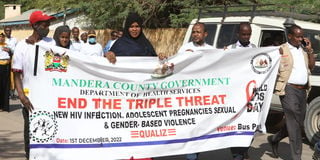HIV/Aids cases down in Mandera, officials say

HIV/Aids cases in Mandera County are declining, the county government says.
The prevalence of the disease has dropped from a high of 1.7 percent in 2013 to about 0.3 percent in 2021, with the annual incidence falling from 121 cases in 2013 to 56 in 2021.
Substance and drug abuse remains the main driving factor for infections, while a high poverty index is also cited as a contributor.
“Our poverty level remains high and everyone is striving to put food on the table and in the process, promiscuous activities are recorded, leading to HIV/Aids infections,” said HIV/Aids county coordinator Abdi Gedi.
The Mandera municipality leads in infections, recording 575 cases.
An influx of Ethiopian and Somali nationals is also fuelling infections.
“Most of our youths are on the internet watching obscene movies and this has led to an increase in HIV/Aids infections as they enact whatever they watch,” he said.
Stigma against patients is at 64 percent, causing mental challenges for patients.
Mr Gedi accused the national government of neglecting the county in the fight against HIV/Aids.
“We are doing everything against this disease on our own as a county together with a few non-governmental organisations, including public sensitisation, treatment and psychological support for patients, a responsibility of the national government,” he said.

Bodaboda riders in Mandera town participate in a procession to mark World AIDs Day on December 1, 2022.
.
A reported condom shortage in other counties has not affected Mandera, with health officials saying they have more than enough in their stores.
“We have enough antiviral drugs, condoms, and enough self-testing kits given free to those who come to our facilities, but we need to be supported in sensitising the public,” Mr Gedi said.
In a period of three years, 82 HIV-positive mothers gave birth in Mandera and only two passed the virus to their babies.
“Through our prevention of mother-to-child treatment, we managed to successfully deliver 80 babies who turned negative and only two cases from Somalia of mothers who had stopped taking the drugs turned positive,” said Mr Mohamed Adan Mohamud, the Mandera Health executive.
He said HIV/Aids is still a serious public health challenge despite recent achievements.
“In the face of this challenge, our county has mounted an exceptional response with support from partners and the national government,” he said.
“A review of the most recent data underscores the epidemic’s continuing threat but also demonstrates the extraordinary impact of the programmes and policies put in place to address HIV.”
An unprecedented level of financing is required to support evidence-based efforts to address HIV/Aids, he added.
Mandera wants to eliminate mother-to-child transmission of HIV, expand antiretroviral treatment and implement innovative prevention techniques to stop new infections.
“I would like to assure you that the Mandera County government is doing all it can to make sure that HIV prevention measures are scaled up,” Mr Mohamud said.
“I am calling on everyone, and especially men, to take the lead and get tested for HIV so as to be role models.
"Indeed, with the devolution of health services to counties, we now have the task of determining our needs, capacity and gaps and define strategic solutions [for them].”
Even as county officials celebrated the few gains, religious leaders were lamenting what they said was an increase in immorality in the county.
“We see our youths engaging in prostitution in this town, something that never used to happen before devolution,” Mr Ali Hassan said.





